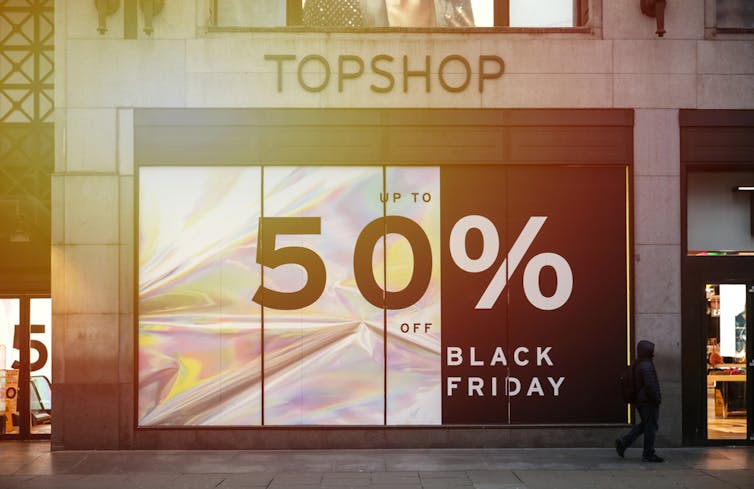Five ways Black Friday shopping will be different in 2020

Not as simple as it used to be. Patrick Shutterstock/Shutterstock
Courtesy of Amna Khan, Manchester Metropolitan University
Friday November 27 marks a key date in the UK’s retail calendar as consumers head online to take advantage of thousands of so-called “Black Friday” discounts. Although the name was traditionally used in the US for the Friday following Thanksgiving, in recent years the shopping event has risen to prominence in the UK as the biggest sales day of the year. The event has now also expanded over the weekend to include “Cyber Monday”.
In 2020, people in the UK will spend an estimated £6 billion on Black Friday and Cyber Monday sales, compared to around £5.6 billion in 2019. However, with restrictions in place due to the COVID-19 pandemic there are many ways that 2020 will look very different to both retailers and consumers.
It has been an extremely tough year for UK retail. COVID-19 lockdown restrictions have hit traditional high street stores hard and this set to be compounded by the prediction that in the six weeks before Christmas, footfall across all UK retail destinations will be reduced by 62%.
With consumers moving online to purchase what they need, many retailers have been offering discounts and sales throughout the year in an effort to attract customers in an extremely competitive market.
Some retailers such as Marks & Spencer and Next will not be taking part in Black Friday at all. Perhaps more surprisingly, other retailers will be bucking the trend by raising their prices or actively campaigning against the need for discounting.
A smaller Christmas bottleneck
Retailers are trying to manage the shift from shopping in-store to online that has increased during the pandemic. By flattening the curve of the peak of online orders on Black Friday and at the beginning of December for Christmas, retailers are trying to encourage consumers start buying earlier and throughout this period.
This is the reason why retailers have been offering discounts over a longer period rather than focusing their efforts on online promotions dedicated to a single date. Retailers are ultimately trying to achieve a much more stable and constant demand for goods over a longer period in the lead up to Christmas rather than the usual peaks.
This approach seems to be taking effect. Research from John Lewis and Partners in October suggested more than 60% of consumers were planning to buy presents before December, with only 2% saying they planned to wait until Christmas Eve.
A rush for online delivery
For many retailers, Black Friday 2020 will present a significant challenge to their online delivery services as consumers will be unable to shop in-store.
While online shopping and home deliveries are increasingly being used by shoppers, the surge caused by COVID-19 has resulted in a 10% increase in comparison to a similar period (March to August) in 2019. But the UK’s delivery system is not currently equipped to manage the huge amount of online orders expected in the lead up to Christmas. The capacity within the UK delivery infrastructure cannot service the increased demand.
Many major UK retailers still place a huge emphasis on their physical high street stores, which means online giants such as Amazon can reap the rewards of Black Friday sales. Global marketing communications company, Wunderman Thompson, predicts that Amazon will account for 65% of all Black Friday spending in 2020 with at least 67% of UK consumers ditching bricks and mortar outlets in favour of web-based spending. Over the Black Friday period in 2018, the online giant took a 26% share of UK sales. Since furlough was introduced in response to COVID-19, 35% of UK online spend has gone to Amazon.
Reduced workforce capacity
In a further challenge to the online delivery infrastructure of UK retailers, a range of practical challenges from COVID-19 mean this Black Friday will be very different.
While online demand from consumers has never been higher, COVID safety restrictions and financial uncertainty means the capacity to deal with online orders has been reduced. In practical terms, this includes factors such as the space to store goods in warehouses and the reduction of staff to manage these spaces and physically pack online orders.
The workforce that would be busy packing and delivering Black Friday orders could be reduced due to social distancing, and safety measures in packing facilities. Meanwhile, furlough and the effect of COVID-19 could force groups of workers in the supply chain to self-isolate or take time off at any given moment.
The Christmas shopping experience
With the government’s COVID-19 lockdown restrictions set to be lifted on December 2, those consumers who decide to do their shopping in-store will have a different experience to usual.
COVID-19 has put paid to the experiential Santa’s Grottos and Christmas activities traditionally seen in shops that involve closer contact between people. Instead, many retailers are moving these online with innovations such as virtual Santa Clauses.

Virtual Santa? Studio Romantic/Shutterstock
And with safety at the forefront of retailers’ minds, which has led to them reconfiguring their stores to make them more COVID-safe by providing wider aisles and more distance between products, consumers may prefer the online experience in the build-up to Christmas without the emphasis on Black Friday sales – a move that some retailers at least will welcome.![]()
Amna Khan, Senior Lecturer in Retail and Consumer Behaviour, Manchester Metropolitan University
This article is republished from The Conversation under a Creative Commons license. Read the original article.



